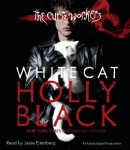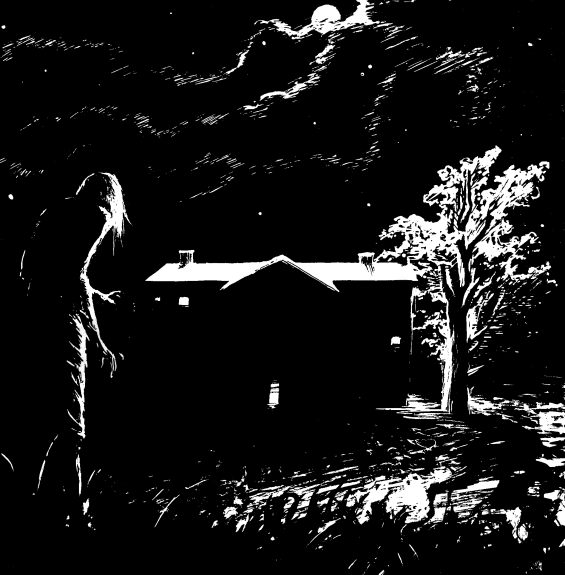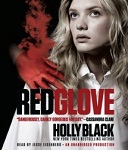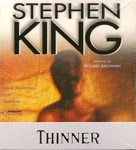
 White Cat: The Curse Workers, Book One
White Cat: The Curse Workers, Book One
By Holly Black; Read by Jesse Eisenberg
1 |MP3| – Approx. 6 Hours 41 Minutes [UNABRIDGED]
Publisher: Listening Library
Published: May 11, 2010
ISBN: 9780307711816
Themes: / Fantasy / Urban Fantasy / Con men / Curses / Magic /
I wake up barefoot, standing on cold slate tiles. Looking dizzily down. I suck in a breath of icy air.
Above me are stars. Below me, the bronze statue of Colonel Wallingford makes me realize I’m seeing the quad from the peak of Smythe Hall, my dorm.
I have no memory of climbing the stairs up to the roof. I don’t even know how to get where I am, which is a problem since I’m going to have to get down, ideally in a way that doesn’t involve dying.
[…]
I’d dreamed of a white cat. It leaned over me, inhaling sharply, as if it was going to suck the breath from my lungs, but then it bit out my tongue instead. There was no pain, only a sense of overwhelming, suffocating panic. In the dream, my tongue was a wriggling red thing, mouse-sized and wet, that the cat carried in her mouth. I wanted it back. I sprang up out of the bed and grabbed for her, but she was too lean and too quick. I chased her. The next thing I knew, I was teetering on a slate roof.
A siren wails in the distance, drawing closer. My cheeks hurt from smiling.
Eventually a fireman climbs a ladder to get me down. They put a blanket around me, but by then my teeth are chattering so hard that I can’t answer any of their questions. It’s like the cat bit out my tongue after all.
Born into a family of curse workers, Cassell doesn’t have the magical powers to be a “worker.” Curses come in all shapes and sizes from transforming victims into something else down to emotionally influencing people. All that is needed is the touch of a finger. This makes gloves much more than a fashion accessory since they are a necessary item of protection.
Curse work is illegal so curse workers are all either part of the powerful crime families, con workers, or exist with their secret on the edges of society. Cassell’s family owes allegiance to a powerful crime family and working cons is as normal as breathing. In fact, working the con is the thing that makes up for not being a worker and Cassell eyes the world from this vantage point, which makes him a solitary figure with few friends.
Cassell has a dark secret, a problem with sleepwalking, and a family who specializes in running cons. He also lost the love of his life, Lila, long ago. However, he put that all behind him and is concentrating on life in boarding school and building a normal life, along with keeping book on the side. (Hey, a guy has to have a little spending money, right?) So when a white cat begins following him everywhere, terrifying dreams bring Lila back into his waking thoughts, and those dark secrets begin surfacing again, Cassell begins to suspect that he is a pawn in a complicated con game.
Can he out-con the pros and solve his problems? Well, of course he can or what would be the point of reading the book? The fascination is with watching Cassell have to admit that he needs help from others, seeing his longing for family ties even as he fears that he may have been betrayed by them,
Holly Black has a fully realized alternate world where the presence of curse working and magic define much more than Cassell’s personal problems. There is a slight but interesting subplot about an organization that is working for “worker’s rights.” The government has begun pushing a testing program, urging workers to come forward and be identified. Family loyalty along with the inner workings of crime families are also interesting embellishments to the plot. The magical abilities described are fascinating, as is the concept of “blow back” which besets anyone who works a curse. Nothing is done with impunity so you’d better be darned sure you want to curse someone because you will suffer some sort of severe reaction in turn.
Perhaps the most interesting aspect of the book is that Cassell is an unreliable narrator. What is more, he knows he is an unreliable narrator as he is afraid that he is too influenced by dreams or that his memory has been worked. Everyone around him is fairly unreliable as well since Cassell is never sure when someone is working a con or being natural. Although some major plot twists are fairly well telegraphed ahead of time, this hardly matters because we are so concerned with the fact that Cassell may be working a con we don’t see or that he is being conned himself.
The story is narrated by Jesse Eisenberg, who is probably best known for portraying the awkward college student in Zombieland or the equally awkward Mark Zuckerberg in Social Network. His trademark delivery works perfectly as the story is told by Cassell who is equally as awkward as either of those movie characters. Furthermore, Eisenberg alters his voice slightly but effectively to portray different characters: a fortune teller, Cassell’s mother, his roommate Sam, and the crime boss all get slightly different intonations which perfectly convey character. I would have liked the book anyway as a straight read, but with Eisenberg’s narration I bought it hook, line, and sinker. Just like an average mark, in fact.
It is called urban fantasy but didn’t really feel that way to me. It is fantasy because of the curse working element but other than that there are precious few fantastic elements. Likewise, it is labeled YA, but aside from the age of the narrator and some elements like having to attend classes, it didn’t feel like something written for younger readers.
I thoroughly enjoyed this book. What can I say? I like con stories. I like the universe Holly Black created. Jesse Eisenberg’s narration pulled me into the story so I stayed there long enough to care about a boarding school student with an interesting set of problems. I also liked the fact that the story arc was concluded in this book except for one element which obviously serves as a bridge to the second book of the series.
It’s just plain fun all round and moves at a fast, addictive pace. Recommended.
Posted by Julie D.


 The Ash Tree
The Ash Tree



